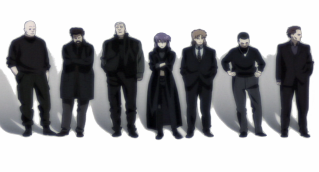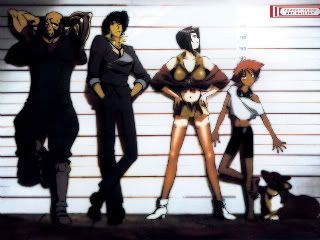Genre: action, sci-fi, cyberpunk
Target age: Older Teen
Content: Sci-fi violence, gun violence, some adult language, brief non-sexual nudity of an android in a factory in one episode
Episodes: 26
Story: Ghost in the Shell Stand Alone Complex takes place in Japan in the year 2030. While the series follows a story arc, known as "complex" episodes, there are breather episodes that follow a "stand alone" storyline. In the world of Ghost in the Shell, it is commonplace for humans to be cyberdized; in other words, they may have their brains augmented with cybernetic implants. Sometimes they may choose to have other body parts, or even their whole bodies, replaced with cybernetic parts. They can access the internet with cyberbrains, or even communicate with each other over the net, which functions like telepathy.
The story is driven by the exploits of Section 9, a covert police force that does not officially exist. All members have cyberbrains, though their levels of cyberdization vary. The seven most important members are Kusanagi (known by her comrades as the Major), Batou, Togusa, Pazu, Saito, Borma, and Ishikawa; and each has a field that they specialize in. For example, Ishikawa specializes in information and surveillance, while Saito specializes in sniping. They are led by Aramaki, who does mission briefings and gives them their orders. Though the episodes do feature all of the above eight, the episodes tend to focus mostly on Kusanagi. A few of the others occasionally have episodes centered around them. Though the Major is the only woman on the team, the men always give her due respect and follow her orders without question. They are all very protective of each other, especially towards Togusa because his entire body, excluding his cyberbrain, is still flesh and blood, and he has a wife and children.
The team is supplemented by artificially intelligent tanks called Tachikoma. Though they are machines, they can speak with each other and with the members of Section 9. An ongoing subplot is concern over whether the Tachikoma are developing self awareness. Batou in particular is very fond of the Tachikoma. They speak with childlike voices and often inspire an "awwww" response.
The plot of Stand Alone Complex can get difficult to follow if the viewer does not pay attention. Blink and you'll miss it. There is much intrigue involving politicians, terrorists, and dishonest medical corporations. Eventually, not even Section 9 is safe from politicians' ulterior motives. The characters sometimes talk about the meaning of existence, what makes one human, and the nature of the "ghost." Most of these center around the Tachikoma or the Major. The Major's situation is especially powerful because she was completely cyberdized at a very young age to survive a terrible accident. Learning to control her cyberbody was a source of emotional pain for her. People who are easily turned offed by existential conversation may not be interested in the series, but they may find themselves intrigued by the storylines if they give the show a chance.
There is also a season two known as Ghost in the Shell Stand Alone Complex 2nd Gig. Season two is 26 episodes long and delves more into the Major's history, as well as her coincidental connection to a terrorist group known as the Individual Eleven.
Voice: Both the Japanese and English voices and dialogue are very good. Some anime fans may recognize the Major's English voice actress Mary Elizabeth McGlynn, who has an extensive list of anime and video games she has been featured in, as well as performing on video game soundtracks.
Music:
- Season One opening theme "Inner Universe" by Origa
- Season Two opening theme "Rise" by Origa
- Season One closing theme "Lithium Flower" by Scott Matthew
- Season Two closing theme "Living Inside the Shell" by Steve Conte and Shanti Snyder
Recommendation: If you don't mind a show that makes you think about life and the nature of humanity versus machine, then Ghost in the Shell may be for you. You have to be willing to pay attention to the plot, or something that happens in later episodes will make little sense. Be prepared for a few moments that may make you squirm.

